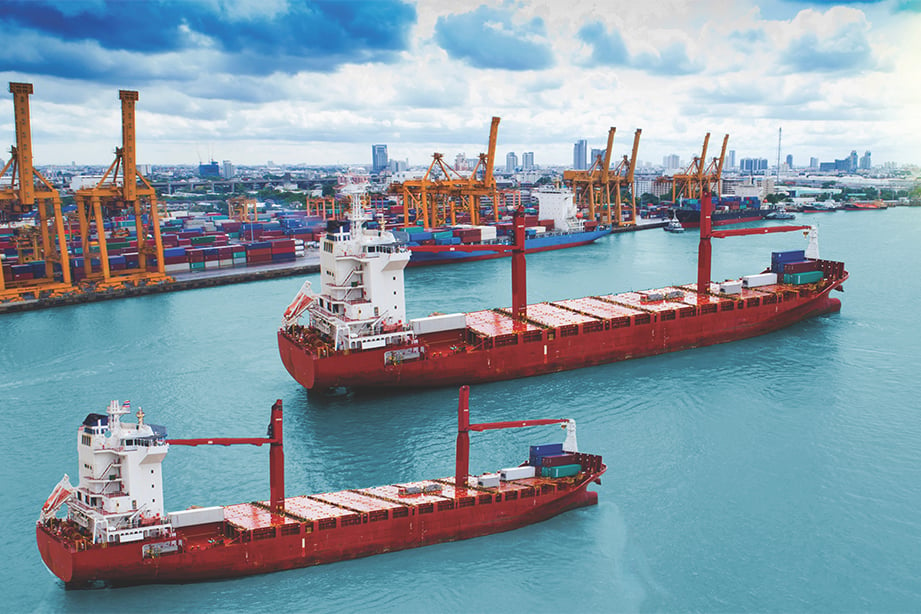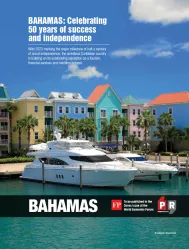Major maritime sector on the crest of a wave
With more than 1,400 vessels flying its flag, the country is well aware of the importance of its maritime activities and enjoys a seat at the top table of industry regulators

Hundreds of goods and passenger vessels fly the flag of the Bahamas worldwide.
Blessed with a strategic location between several continents and proximity to crucial transhipment lanes that serve a comprehensive range of global consumer, industrial and commodity markets, it is no surprise the Bahamas has established an experienced and efficient maritime sector that complements other segments of the transportation and logistics industries.
Founded on centuries of seafaring tradition, the country’s maritime sector benefits from a rich legislative and judicial background. The Bahamas Register is closely modelled on that of the UK, meaning shipowners, lawyers, bankers and other professionals involved in international shipping are familiar with it. With hundreds of vessels flying its flag, the country is well aware of the importance of overseeing a diverse and varied portfolio of ships registered across a range of market sectors. The registry has developed an in-depth knowledge and understanding of each sector’s specific needs, including in the cruise, bulk, general cargo, chemical and LNG tanker, and offshore oil and gas support vessel categories.
Much of the industry’s success can be attributed to the work of The Bahamas Maritime Authority (BMA). The authority was formed three decades ago to ensure the sector continued to grow while adhering to the strictest regulatory and industry standards. The BMA’s comprehensive range of responsibilities includes the registration of vessels, enforcement of shipboard safety, environment and security requirements and year-round monitoring and improvement of operational standards.

The body — governed by a board of highly experienced and influential representatives from the government, transport and shipping sectors — also represents the Bahamas in the International Maritime Organization (IMO) and with other key bodies like the European Commission and the US Coast Guard. “The maritime sector has established itself because of our unique location,” states JoBeth Coleby-Davis, Minister of Transport and Housing. “We have the access to tankers, vessels, transiting through our waters to get to the US side and to get over to the European side and Africa.
“Over the years, we have built relationships with various transshipment companies, transhipment hubs and other countries to connect our ports. We have created strong relationships with the cruise ship industry as that also helps us to balance our tourism product because the cruise ships berth at our ports, then disembark guests who take part in excursions and support our small business owners, local vendors and taxi drivers.” According to the highly qualified minister, who has vast experience in legislative matters having been a lawyer, the maritime sector has been updating legislative agenda and regulatory agenda so it falls in line with IMO edicts. “We are a voice on behalf of all our flag members,” she adds. “The firms flying our flags on their vessels expect the Bahamas to be their voice.”
Choppy fiscal waters overcome
Having taken the helm at the BMA only a year before the pandemic, MD and CEO Captain Dwain Hutchinson faced a major challenge when it came to steering the authority through some of the toughest ever periods for shipping and tourism. Having done so with aplomb, the experienced seafarer is eager to highlight the success of the authority and its vital role in running the seventh-largest flag registry in the world — one that features an impressive total of more than 1,400 vessels.

“One of our strategic objectives has always been to provide a quality customer service that allows our vessels to continue to operate,” he says. “Because of the pandemic we had to advance a lot of the processes that we already had in place and a lot of what was implemented centered around automation and leveraging of the online tools. That became a big part of the BMA’s ability to continue to support the industry. This agility was reflected globally within shipping, because throughout the pandemic the ships continued trading, whereas aircraft were not flying. “The Bahamas is the number one flag for the cruise ship sector and we were able to support that industry. We have over 140 cruise ships on our registry and during the pandemic many were not able to operate commercially.”
Full speed ahead for the BMA
With the global shipping industry facing hurdles ranging from container costs, supply chain disruption, climate change and geopolitics, the Bahamas is strengthening international collaboration to support the sector and ensure smooth passage. “The BMA has a team of competent and experienced marine professionals who participate in every IMO meeting,” Hutchinson adds. “When we sit at the table at the IMO or the International Labour Organisation, we bring views that reflect the Bahamas’ perspective and our policy position and that reflect the practical realities of ship operating; hence why we are seen as a pragmatic maritime organization.”
Report Contents:

 Download the PDF
Download the PDF